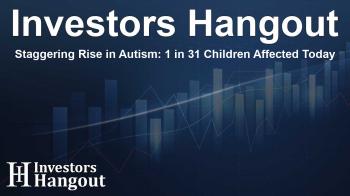Staggering Rise in Autism: 1 in 31 Children Affected Today

Understanding the Surge in Autism Diagnoses
Recent data sheds light on a dramatically increasing trend in autism diagnoses among children across the United States. Over the years, the Centers for Disease Control and Prevention (CDC) have been monitoring autism prevalence. From a startling 1 in 10,000 in 1970 to the current report indicating that 1 in 31 children are diagnosed with autism spectrum disorder (ASD), this rise represents a 384% escalation since the year 2000. This shift reveals a concerning pattern that affects families at an unprecedented scale, stirring the need for attention and action.
Key Findings from the CDC's 2022 Report
The newly released 2022 report brings forth noteworthy statistics that underline the gravity of the situation regarding autism in children. Among these findings:
- 1 in 31 children in the U.S. now holds a diagnosis of autism.
- The ratio is even higher among boys, with 1 in 20 diagnosed.
- Minority populations are seeing sharper rises in autism diagnoses, such as:
- Asian and Pacific Islander – 38.2 per 1,000
- American Indian and Alaska Native – 37.5 per 1,000
- Black – 36.6 per 1,000
- Hispanic – 33.0 per 1,000
- White – 27.7 per 1,000
- Approximately 64% of children diagnosed with autism also have an intellectual disability or are at risk of one.
- Children aged 4 years are now 1.7 times more likely to get diagnosed compared to those four years ago.
Exploring the Reasons Behind the Increase
Many experts attribute the sharp rise in autism diagnoses to increased awareness and expanded diagnostic criteria. However, some experts, such as Walter Zahorodny, Associate Professor at Rutgers New Jersey Medical School, assert there’s more to it. He voices concern that suggesting the increase is solely due to heightened awareness or shifting definitions is overly simplified. This perspective offers a call to investigate further into underlying factors contributing to the prevalence of autism.
The Role of Support Organizations
In light of these findings, organizations like The Autism Community in Action (TACA) are doubling down on their efforts to assist families grappling with the realities of autism. TACA emphasizes that every statistic represents an individual child and family facing real challenges. With nearly 25 years of experience, TACA is committed to providing education, support, and guidance to help families navigate the numerous hurdles they encounter.
TACA's Contributions and Support
As a national nonprofit, TACA serves over 61,000 active members through webinars, scholarship programs, educational events, and various online resources. They aim to foster a strong sense of community and support for affected families and encourage collective action to meet the rising needs within the autism community.
About The Autism Community in Action (TACA)
TACA is dedicated to serving families impacted by autism, providing a spectrum of resources designed to assist in education, emotional support, and hands-on guidance. Established in 2000 and situated in Irvine, CA, the organization provides numerous programs, including educational meetings and a parent mentorship program designed to meet the diverse needs of families navigating autism challenges. They maintain an active presence on social media, cultivating community engagement and sharing essential insights to assist families. To learn more about their services and resources, visit their official website.
Frequently Asked Questions
What does the latest CDC report say about autism rates?
The CDC report indicates that 1 in 31 children are now diagnosed with autism, reflecting a dramatic increase over the past decades.
Why has the rate of autism diagnoses increased so significantly?
While some believe the rise is due to greater awareness and broader diagnostic criteria, experts argue that the reasons are complex and may require further investigation.
What age group is seeing the highest increase in autism diagnoses?
Children aged 4 years are identified as being 1.7 times more likely to be diagnosed than those in prior years.
How does TACA support families affected by autism?
TACA provides educational resources, scholarship programs, virtual support, and community engagement to assist families navigating autism.
What additional resources does TACA offer?
TACA offers online support groups, educational meetings, and an annual conference designed to educate and empower families facing autism challenges.
About The Author
Contact Logan Wright privately here. Or send an email with ATTN: Logan Wright as the subject to contact@investorshangout.com.
About Investors Hangout
Investors Hangout is a leading online stock forum for financial discussion and learning, offering a wide range of free tools and resources. It draws in traders of all levels, who exchange market knowledge, investigate trading tactics, and keep an eye on industry developments in real time. Featuring financial articles, stock message boards, quotes, charts, company profiles, and live news updates. Through cooperative learning and a wealth of informational resources, it helps users from novices creating their first portfolios to experts honing their techniques. Join Investors Hangout today: https://investorshangout.com/
The content of this article is based on factual, publicly available information and does not represent legal, financial, or investment advice. Investors Hangout does not offer financial advice, and the author is not a licensed financial advisor. Consult a qualified advisor before making any financial or investment decisions based on this article. This article should not be considered advice to purchase, sell, or hold any securities or other investments. If any of the material provided here is inaccurate, please contact us for corrections.

